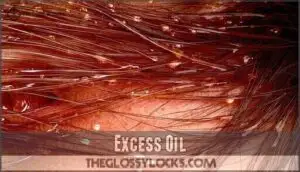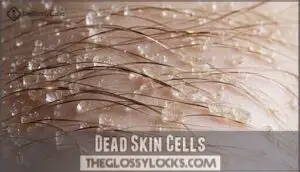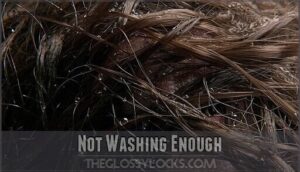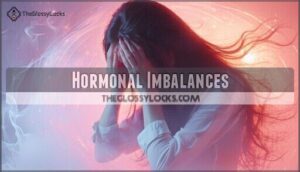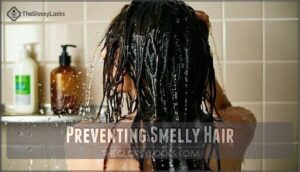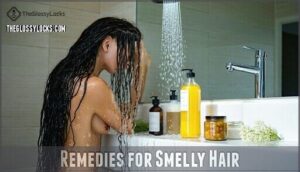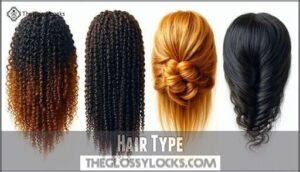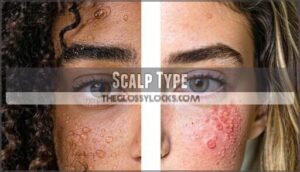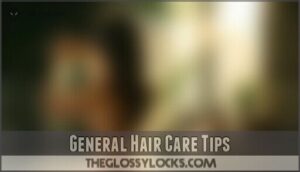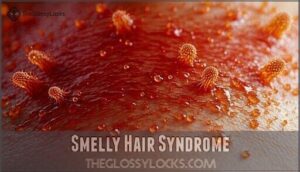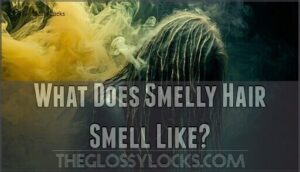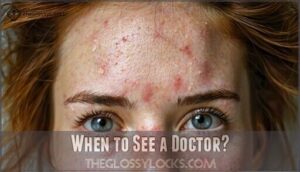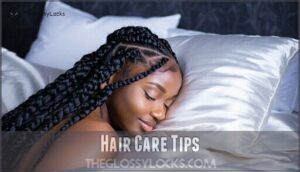This site is supported by our readers. We may earn a commission, at no cost to you, if you purchase through links.
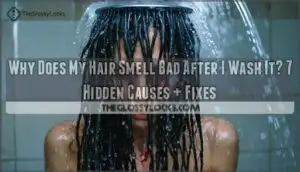
The main culprit, Malassezia furfur, loves munching on your excess oil and dead skin cells, then burps out these gross-smelling compounds that make your hair smell musty or sour.
Poor rinsing habits are often the real problem – you’re leaving soap residue that bacteria love. Hot water makes things worse by stripping your scalp’s natural oils, forcing it to overproduce sebum that feeds those smelly microbes.
Product buildup creates sticky layers where odor-causing bacteria can hide and multiply. Hard water leaves mineral deposits on your hair that act like tiny shelves for microbes to set up shop.
But here’s the kicker – if you’ve got underlying scalp conditions like seborrheic dermatitis, no amount of regular shampooing will solve your smelly hair problem.
Table Of Contents
- Key Takeaways
- Causes of Smelly Hair
- Preventing Smelly Hair
- Remedies for Smelly Hair
- Choosing Hair Care Products
- General Hair Care Tips
- Smelly Hair Syndrome
- What Does Smelly Hair Smell Like?
- When to See a Doctor?
- Hair Care Tips
- Frequently Asked Questions (FAQs)
- Why does my hair smell bad after washing?
- What causes a smelly scalp & hair?
- Why does my hair smell like mildew after washing?
- Are smelly hair a bad thing?
- Does your hair smell good without washing it?
- Why does my hair smell like dandruff?
- What are the long-term effects of smelly hair?
- Are there any lifestyle changes that can help prevent smelly hair?
- What other medical conditions can cause smelly hair?
- How often should I wash my hair to prevent smelly hair?
- Conclusion
Key Takeaways
- Your hair smells bad after washing because odor-causing bacteria and yeast like Malassezia aren’t completely eliminated—they feed on excess sebum and dead skin cells, producing volatile compounds that create musty or sour odors.
- You’re not rinsing thoroughly enough, using water that’s too hot (which strips natural oils and triggers overproduction), or dealing with product buildup that traps bacteria and creates breeding grounds for microbes.
- Switch to sulfate-free shampoos, use lukewarm water, and consider medicated shampoos with ketoconazole or salicylic acid to target fungal infections and bacterial overgrowth at their source.
- Establish a consistent hair care routine with proper scalp exfoliation, complete drying, and stress management—since hormonal imbalances from stress can increase oil production and disrupt your scalp’s natural balance.
Causes of Smelly Hair
You’ve just stepped out of the shower with squeaky-clean hair, but somehow it still smells funky—trust me, you’re not alone in this puzzling situation.
Your scalp’s complex ecosystem can harbor odor-causing bacteria, excess sebum, and product buildup that survives even the most thorough washing routine.
Excess Oil
When your scalp goes into oil overdrive, sebum production becomes a major headache. Your sebaceous glands pump out this natural protective oil, but too much creates a feast for odor-causing bacteria.
Skip washing too often and you’re left with greasy buildup, especially when styling products pile on top of all that excess sebum.
Here’s what excess oil means for your hair:
- Your scalp feels greasy within hours of washing
- Hair appears flat and lifeless despite being freshly cleaned
- Sweet or musty odors develop between wash days
- Itching and irritation increase as bacteria multiply
- Styling products seem to weigh your hair down immediately
What you eat matters too—lots of dairy and junk food can ramp up oil production.
You’ll need to tweak your wash schedule and grab shampoos made for greasy scalps to get things under control.
Yeast
Malassezia furfur is the culprit behind scalp yeast overgrowth.
This fungus loves oily conditions and churns out compounds that smell musty and sour. Even fresh-washed hair can’t shake the odor when these fungi multiply out of control.
These fungi are part of the healthy skin flora. Antifungal shampoos containing ketoconazole target these fungi effectively. Yeast treatment requires consistent use of medicated products to restore scalp balance and eliminate fungal infection.
Dead Skin Cells
Dead skin cells naturally shed from your scalp, but when cell turnover slows down, these cells accumulate and create scalp buildup. This buildup traps sebum and bacteria, forming odor compounds that make your hair smell funky even after washing. Your skin microbiome gets disrupted, making the problem worse.
Here are key exfoliation methods to tackle dead skin cells:
- Use a scalp scrub with gentle physical exfoliants once weekly
- Try chemical exfoliants like salicylic acid shampoos
- Massage your scalp during hair washing to loosen buildup
- Apply pre-wash treatments with fruit acids
- Consider rotating brushes to stimulate healthy cell turnover
Not Washing Enough
If you’re not washing your hair often enough, you’re setting yourself up for some seriously funky scalp smells.
When oil builds up and mixes with trapped sweat, it creates the perfect playground for bacteria to multiply and stink up the place.
Your scalp becomes like a neglected kitchen sponge, harboring bacteria that thrive in greasy conditions. Establishing a proper hair care routine with regular hair washing prevents this cycle.
Most people need hair hygiene every 2-3 days, though oily scalps may require daily cleansing.
Sweating
When sweat glands and sebum production work together, your scalp turns into a bacterial hotspot after workouts.
Hyperhidrosis makes this worse—all that extra moisture mixes with your scalp’s natural oils.
The sweat composition—containing proteins and salts—feeds odor-causing microbes. Post-workout odor develops when you delay hair washing, allowing bacteria to multiply.
Effective sweat management requires immediate cleansing to break this cycle.
Pollution
Urban pollution wreaks havoc on your freshly washed hair, turning it into a magnet for environmental odors and airborne particles. Smog effects from traffic exhaust, industrial fallout, and other environmental factors cling to hair fibers like unwanted guests.
These pollutants create a perfect storm for hair smell issues, even after thorough hair washing. Your hair care routine can’t always combat this invisible enemy that makes your locks absorb everything from cigarette smoke to cooking fumes during your daily commute.
Hormonal Imbalances
Hormonal shifts don’t just affect your mood—they completely throw off your scalp’s delicate ecosystem. When your hormones go haywire, your scalp starts pumping out way more oil than usual, turning your head into the perfect hangout spot for stinky bacteria.
Pregnancy odor and endocrine disorders worsen these issues. Your hair smell intensifies because fluctuating hormones disrupt your scalp’s microbiome, making causes of smelly hair more pronounced than you’d expect. Sometimes, this can be attributed to excess sebum production on the scalp.
Stress
Stress triggers a cascade of reactions in your body that directly impact your scalp’s health. When you’re overwhelmed, stress hormones like cortisol increase oil production and create scalp tension that disrupts your natural immune response.
This imbalance allows odor-causing bacteria to flourish, making hair smell even after washing. Mental health struggles compound the problem by affecting your hair care routine.
Simple lifestyle changes like stress management techniques can restore your scalp’s balance and eliminate persistent odors.
Foods
Your diet plays a bigger role in hair odor than you might think. Pungent foods like garlic and onions can seep through your pores, affecting sebum production and creating lingering smells on your scalp.
Poor gut health and nutrient deficiencies also disrupt your body’s natural balance. Dairy products can increase oil production, while dehydration affects your scalp’s ability to flush out toxins.
Your dietary choices and lifestyle habits directly influence how your hair smells, even after washing.
Preventing Smelly Hair
You can prevent smelly hair by establishing a consistent scalp care routine that targets the root causes of odor-producing bacteria and excess sebum production.
Think of it like brushing your teeth twice daily—regular maintenance with the right products keeps your scalp’s microbial balance in check and prevents that "clean but smelly" frustration.
Establish a Hair Care Routine
Creating a solid hair care routine customized to your scalp health needs can make all the difference in maintaining fresh-smelling locks. Think of it as your personal game plan for conquering odor before it starts.
Your routine should include these key elements:
- Hair washing frequency adjusted to your scalp type and lifestyle
- Scalp exfoliation once weekly to remove buildup and dead skin
- Product rotation between clarifying and gentle shampoos
- Hair drying techniques that guarantee complete moisture removal
Routine maintenance isn’t just about washing—it’s about understanding what your hair hygiene needs are and sticking to consistent hair care practices.
Medicated Shampoos
Think of medicated shampoos as prescription treatments for your scalp—they tackle the fungal infections and bacterial buildup that make your hair smell funky.
These specialized formulas pack active ingredients that get your scalp back to a healthy state.
Active Ingredient Best For
Adjust your shampoo frequency based on scalp condition—usually 2-3 times weekly for maintenance.
Home Remedies
Natural remedies can work wonders for odor control. Apple cider vinegar rinses restore your scalp’s pH balance while eliminating bacteria. Baking soda gently exfoliates dead skin cells, while aloe vera soothes irritation.
Mix lemon water with tea tree oil for an invigorating treatment that fights microbes naturally. These herbal treatments and natural oils offer gentle alternatives to harsh chemicals, giving you fresher hair without damaging your scalp’s protective barrier.
Sulfate-Free Shampoos
Making the switch to sulfate-free shampoo might be the game-changer your scalp’s been waiting for, especially if you’re battling that persistent hair odor that just won’t quit.
These milder formulas work with your hair’s natural chemistry instead of against it, keeping your pH levels balanced and your scalp happy without the aggressive stripping that leaves your hair feeling like straw.
Here’s why sulfate-free shampoos work better for odor control:
- Preserve natural oils that fight bacteria
- Reduce scalp inflammation that triggers smell
- Maintain proper pH balance for healthy follicles
- Prevent over-drying that leads to excess oil production
- Facilitate gentle cleansing without harsh chemicals
When you’re dealing with persistent hair odor, clarifying shampoos with sulfate alternatives become your best friend. They clean effectively without causing the rebound oiliness that creates more problems.
Wear Hats or Scarves
Your choice of hats or scarves plays a bigger role in hair odor than you’d think. Breathable materials like cotton prevent moisture buildup that causes hair to smell bad after washing.
Meanwhile, synthetic fabrics trap sweat and oils, creating the perfect breeding ground for odor-causing bacteria.
Smart headwear hygiene means choosing natural fabric choices and washing accessories regularly to maintain fresh-smelling hair.
Avoid Scratching
Every scratch you make on your scalp creates micro-wounds that bacteria love to call home. When you scratch, you’re actually damaging hair follicles and disrupting your scalp’s natural protective barrier. This gentle touch approach isn’t just about willpower—it’s about breaking the itch-scratch cycle that leads to smelly hair.
Scalp conditions and hair odor go hand-in-hand when scratching becomes habitual. Your fingernails harbor bacteria that transfer directly to these tiny wounds, creating perfect breeding grounds for odor-causing microbes. Hair product buildup gets pushed deeper into follicles during scratching, making it harder to remove during regular hair washing techniques.
For itch relief without the damage, try a scalp brush with soft bristles or a gentle scalp massage instead. These scratch prevention methods satisfy the urge while promoting healthy circulation and removing dead skin cells safely.
Healthy Diet
What you eat has way more impact on your scalp than most people realize. When your diet’s off balance, it messes with your body’s nutrient levels and can trigger your scalp to pump out extra oil – which becomes a feast for the bacteria that make your hair smell funky.
Focus on fresh foods rich in healthy fats like omega-3s, which promote scalp health naturally. Balanced meals help regulate oil production while your hair care routine addresses external factors.
Skip pungent foods that can worsen odors.
Stress Management
Here’s the thing about stress and smelly hair—they’re more connected than you’d think. When you’re constantly stressed out, your body goes haywire with hormones, pumping out extra oil that bacteria absolutely love.
Your scalp becomes this greasy playground where odor-causing germs throw their own little party.
Effective stress management techniques can restore emotional balance and foster mental wellbeing:
- Practice mindful relaxation through deep breathing exercises daily
- Try yoga or meditation for stress reduction and self care
- Establish consistent sleep schedules to regulate cortisol levels
- Engage in regular physical activity to release tension naturally
Managing stress isn’t just good for your mind—it’s hair care tips that actually work from the inside out.
Remedies for Smelly Hair
That funky smell lingering in your hair after washing? Targeted remedies can get your scalp back in balance and kick those stubborn odors to the curb.
You’ll find effective solutions ranging from kitchen staples like apple cider vinegar to specialized anti-dandruff shampoos that tackle the root cause of microbial overgrowth.
Lemon Juice
Lemon juice acts as nature’s scalp refresh solution when smelly hair strikes after washing. The citric acid in lemon water naturally balances your scalp’s pH levels, creating an environment where odor-causing bacteria can’t thrive. This citrus therapy works by breaking down residue buildup that regular shampoos miss.
To create an effective hair rinse, mix two tablespoons of fresh lemon juice with one cup of cool water. After your regular hair washing routine, pour this mixture over your scalp and let it sit for two minutes before rinsing thoroughly. The lemon benefits include removing excess oils and dead skin cells that contribute to persistent odors.
This natural remedy also adds shine while neutralizing stubborn smells. Use this treatment once weekly to maintain scalp health without over-drying your hair.
Essential Oils
Natural fragrances from essential oil blends can work wonders when your hair smells bad after washing. Tea tree, rosemary, and lavender oils offer powerful aromatherapy benefits that combat odor-causing bacteria on your scalp.
You can create scented hair masks by mixing a few drops with carrier oils like jojoba or coconut oil. Different oil extraction methods produce varying potencies, so start with 2-3 drops per application.
These concentrated botanical extracts don’t just mask smells—they actually address the root causes. Regular use in your hair care tips routine helps maintain a fresh, clean scent between washes.
Apple Cider Vinegar
Apple cider vinegar works like a reset button for your scalp. Its acidic properties restore your scalp’s natural pH balance, which often gets thrown off by harsh shampoos and styling products.
This natural remedy acts as a powerful hair rinse that cuts through buildup while neutralizing odor-causing bacteria. Mix one part apple cider vinegar with three parts water, then pour it over your hair after shampooing.
The vinegar benefits include removing excess oils and dead skin cells that contribute to smelly hair. Let it sit for a few minutes before rinsing thoroughly. Your hair will feel cleaner and smell fresher thanks to this time-tested solution for scalp conditions.
Anti-Dandruff Shampoos
While apple cider vinegar works wonders, antifungal shampoo takes scalp treatment to the next level. These specialized formulas target dandruff causes at their source, addressing the underlying scalp conditions that create smelly hair.
Anti-dandruff shampoos contain powerful ingredients that penetrate each hair follicle, providing thorough flake removal while combating odor-causing microorganisms. Here’s what makes them so effective:
- Zinc pyrithione reduces fungal growth and controls oil production
- Ketoconazole fights stubborn yeast infections causing persistent odors
- Selenium sulfide slows skin cell turnover and reduces flaking
- Salicylic acid exfoliates dead skin cells clogging follicles
- Coal tar normalizes skin cell production and reduces inflammation
Think of these shampoos as your scalp’s personal bouncer—they kick out the troublemakers causing dandruff and unpleasant smells. Use them 2-3 times weekly, alternating with your regular shampoo to maintain scalp health without over-drying your hair.
Hot Water
Hot showers feel wonderful, but they’re secretly sabotaging your hair washing routine. High water temperature strips your scalp’s natural oils, triggering overproduction that feeds odor-causing bacteria.
This thermal damage also increases hair porosity, making strands absorb and retain smells more easily.
Your scalp sensitivity spikes with hot water, creating inflammation that worsens smelly hair. Switch to lukewarm temperatures for better hair drying and healthier hair care tips.
Hair Products
Beyond avoiding hot water, the hair care products you choose play a major role in scalp health. Product buildup from heavy conditioners and styling products creates the perfect breeding ground for odor-causing bacteria.
When you’re selecting hair care products, look for sulfate alternatives that clean without stripping your scalp’s natural protective barrier. Shampoo ingredients matter more than you think—harsh chemicals can disrupt your scalp’s pH balance, making bad smells worse.
Weekly clarifying masks work wonders for clearing out the stubborn gunk that your regular shampoo leaves behind.
Skip products loaded with artificial fragrances—they’ll just cover up the real problem instead of fixing it.
Focus on gentle, pH-balanced formulas that nurture your scalp’s natural ecosystem rather than fighting against it.
Choosing Hair Care Products
You can’t just grab any shampoo off the shelf and expect your scalp microbiome to cooperate—different hair types and scalp conditions require targeted formulations to prevent odor-causing bacterial overgrowth.
Understanding your specific scalp type, whether oily, dry, or sensitive, helps you select products with the right pH balance and active ingredients to maintain a healthy scalp environment.
Hair Type
Your hair type dictates which hair care tips work best for tackling odors. Different hair fibers have unique needs:
- Curly Hair – Sebum moves slower down twisted strands, creating scalp buildup
- Oily Roots – Overactive oil glands need frequent, targeted hair washing techniques
- Dry Scalp – Produces flakes that trap bacteria and create frizzy locks
- Damaged Ends – Porous hair fibers absorb environmental odors more easily
Scalp Type
Your scalp type matters just as much as your hair type when you’re picking products to fight odor. How much oil your scalp produces directly impacts sebum buildup and smell.
Oily scalps create excess sebum that feeds bacteria in your hair follicles, while dry scalps can develop skin issues that also cause unpleasant odors.
Pay attention to scalp sensitivity and existing scalp conditions like dermatitis or dandruff. These issues can disrupt your scalp’s natural pH balance, making it harder to maintain proper scalp hygiene. If you notice flaking, irritation, or persistent odors despite regular washing, your scalp type likely needs specialized care.
Choose products formulated for your specific scalp needs—medicated shampoos for problematic scalps or gentle formulas for sensitive skin.
General Hair Care Tips
Good hair care isn’t just about shampooing—it’s building daily routines that keep your scalp happy and balanced.
A quick scalp massage while you wash stimulates blood flow and spreads those natural oils your hair craves.
- Practice gentle combing when hair’s wet to prevent breakage
- Schedule regular trimming every 6-8 weeks for healthier ends
- Use proper hair oiling techniques weekly for deep nourishment
These hair care routines work together with quality shampoo and conditioner to keep your locks fresh.
Smelly Hair Syndrome
Smelly Hair Syndrome affects up to 40% of adults who struggle with persistent scalp odor despite regular washing. This condition stems from microbial overgrowth, particularly Malassezia yeast and bacteria that thrive in your hair follicles. Understanding your scalp health is essential for effective smell prevention and hair hygiene management.
| Cause | Impact | Solution |
|---|---|---|
| Microbial overgrowth | Persistent hair odor | Antifungal shampoos |
| Seborrheic dermatitis | Flaking + smell | Medical treatment |
| Inadequate washing | 4x more odor | Regular cleansing |
Professional diagnosis helps identify underlying odor causes and develop targeted treatment plans for preventing hair odor effectively.
What Does Smelly Hair Smell Like?
Identifying smelly hair involves recognizing distinct odor patterns that signal underlying scalp issues. Your hair’s foul smell can manifest in several ways, from a sour odor resembling spoiled milk to a musky aroma that lingers even after washing.
Here are three common scent profiles:
- Yeasty or cheesy pungent scent – indicates Malassezia overgrowth breaking down scalp oils
- Musty, mildew-like hair odor – suggests fungal activity from insufficient drying
- Metallic tinge with rotten egg notes – signals bacterial sulfur production on your smelly scalp
These scalp odor variations help pinpoint specific causes behind why your hair smells bad.
When to See a Doctor?
Sometimes scalp odor won’t budge despite your best efforts. If your scalp smells persistently foul despite regular washing and basic hygiene, it’s time to seek professional help.
You’ll want to see a dermatologist if you experience persistent odor lasting four weeks or sudden changes with severe symptoms like redness, swelling, or hair loss. Dermatological conditions such as scalp infections require medical treatments for smelly scalp that only professionals can prescribe.
Treatment failure with home remedies signals the need for specialized scalp health evaluation.
Hair Care Tips
Smart hair care tips can transform your post-wash routine from frustrating to fabulous. Focus on scalp hygiene with proper brush hygiene—clean your tools weekly to prevent bacterial transfer. Master hair washing techniques using lukewarm water and thorough rinsing. Avoid poor drying practices by gently patting hair dry. Create a night routine with protective styles to minimize friction.
- Practice scalp exfoliation weekly using gentle circular motions to remove buildup
- Perfect product application by focusing on roots first, then working downward
- Maintain brush hygiene by washing tools with antibacterial soap regularly
- Develop protective styles like loose braids to prevent overnight tangling and odor
- Establish consistent hair care tips including proper drying and storage techniques
Frequently Asked Questions (FAQs)
Why does my hair smell bad after washing?
Your hair smells bad after washing because bacteria and fungi thrive on your damp scalp, product buildup traps odors, or you’re not rinsing thoroughly enough to remove all residue.
Your hair still smells funky after washing because odor-causing bacteria survive on your scalp despite thorough cleaning
What causes a smelly scalp & hair?
You’re not barking up the wrong tree here. Your scalp’s microbial ecosystem produces odor-causing compounds when bacteria, fungi, and yeast become imbalanced.
Product buildup, excess sebum, and poor drying practices create perfect breeding conditions for these smell-producing microorganisms.
Why does my hair smell like mildew after washing?
Mildew odor after washing often results from incomplete drying, allowing bacteria and fungi to flourish in your damp scalp environment.
Moisture trapped near your roots creates perfect breeding conditions for microorganisms that produce that musty smell you’re detecting.
Are smelly hair a bad thing?
Unpleasant scalp odors aren’t just cosmetic concerns—they’re signals your scalp’s microbiome is out of balance.
You’re dealing with bacterial overgrowth, fungal issues, or sebum buildup that needs attention for healthy hair.
Does your hair smell good without washing it?
Naturally, your scalp produces sebum oils that create a distinct scent within hours.
This buildup of natural oils, dead skin cells, and sweat creates an environment where bacteria thrive, leading to noticeable odors even without external pollutants.
Why does my hair smell like dandruff?
Dandruff affects 50% of adults globally, creating an environment where odor-causing fungi like Malassezia flourish.
Your hair’s dandruff smell comes from yeast overgrowth breaking down oils into musty compounds that stick to strands.
What are the long-term effects of smelly hair?
Persistent scalp odor can lead to insecurity and discomfort, affecting confidence in social interactions, at work, and in relationships.
Left untreated, chronic fungal infections may worsen underlying conditions like dermatitis or folliculitis.
Are there any lifestyle changes that can help prevent smelly hair?
You can prevent smelly hair by washing regularly, using clarifying shampoos weekly, drying hair completely, managing stress, eating less pungent foods, and switching to sulfate-free products for better scalp health.
What other medical conditions can cause smelly hair?
Medical conditions often cause mysterious hair odors that puzzle both patients and doctors.
Seborrheic dermatitis, psoriasis, eczema, fungal infections, and hyperhidrosis can all trigger scalp odors through inflammation, yeast overgrowth, or excess sweating.
How often should I wash my hair to prevent smelly hair?
Your washing frequency depends on your scalp type. Oily scalps need daily washing, while normal scalps benefit from every 2-3 days. Dry scalps can go 3-4 days between washes without developing odor.
Conclusion
Getting to the bottom of why your hair smells bad after washing means looking at the real culprits instead of just covering up the problem.
Once you figure out what’s actually causing those persistent odors, you can fix your routine where it counts.
Focus on thorough rinsing, using appropriate water temperature, and addressing any underlying scalp conditions. With consistent care and the right products, you’ll achieve fresh-smelling hair that stays clean between washes.
- https://www.frontiersin.org/journals/cellular-and-infection-microbiology/articles/10.3389/fcimb.2018.00346/full
- https://www.specialchem.com/cosmetics/requirement/unpleasant-hair-odor-reduction
- https://www.yahoo.com/lifestyle/why-does-scalp-smell-dermatologists-124421085.html
- https://theradome.com/blogs/blog/why-does-my-hair-stink-after-i-wash-it
- https://pmc.ncbi.nlm.nih.gov/articles/PMC8138261/

